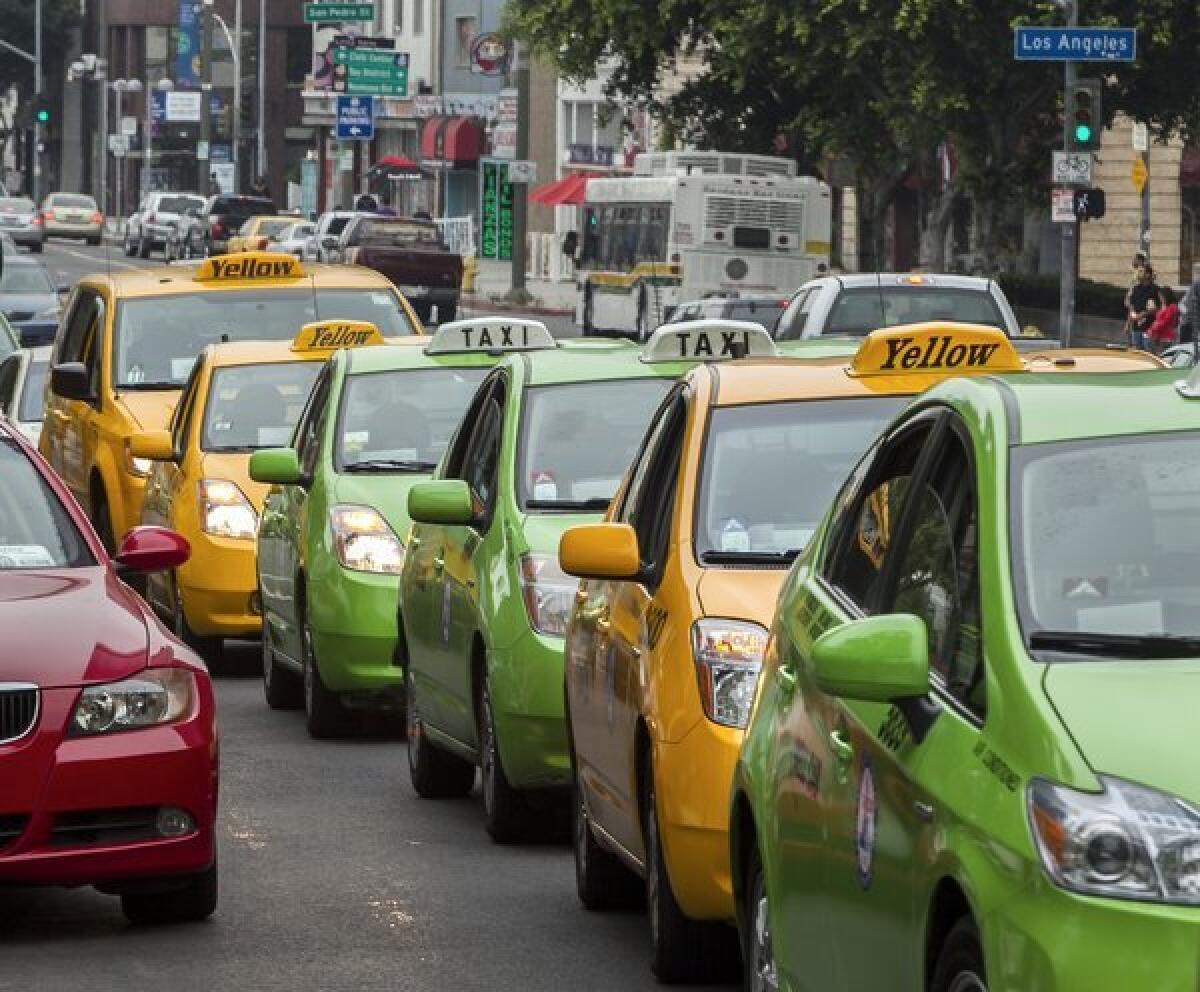State to L.A.: Hands off Uber, Lyft, Sidecar and InstantCab

California Public Utilities Commission Chairman Michael R. Peevey sent a not-so-subtle message to the Los Angeles City Council on Tuesday: Hands off Uber, Lyft and Sidecar.
The commission had previously asserted jurisdiction over the companies and their ilk, which enable customers to use a smartphone app to summon rides from limousines (Uber) or private cars (Lyft, Sidecar, InstantCab). Peevey’s proposed rule, which the full commission could consider in September, declares that such “transportation network companies” are “charter party passenger carriers,” which are subject to the PUC’s jurisdiction, and not taxis, which would be subject to local oversight.
Some members of the Los Angeles City Council have taken the opposite view, proposing an ordinance to regulate Web-enabled transportation companies as taxis. So has the city’s Department of Transportation, which sent cease-and-desist letters to Uber, Lyft and Sidecar in late June. The companies have continued to operate, arguing that the city doesn’t have the authority to enforce its taxi regulations on them.
SLIDE SHOW: 10 reasons to salute L.A.’s transportation future
The Times’ editorial board sided with the companies shortly after the cease-and-desist letters went out, saying, “The city should stop trying to guard the cab companies’ turf by resisting state-regulated services that give consumers and drivers more options.”
Proponents of local regulation argue that Uber et al pose a risk to the public because they’re unregulated and uninsured. Although both of those assertions are false, Peevey’s proposal would place more stringent safety rules on the companies than the commission had previously imposed. Among other things, it would require each company to obtain a state license, conduct criminal background checks on drivers and inspect their cars, impose a zero-tolerance policy for drug and alcohol use by drivers, set up a driver training program and maintain $1 million in excess liability insurance.
It also made clear that the services are not permitted to pick up passengers who hail their drivers in the street. But they’re not set up to function that way; their systems require rides to be reserved through a smartphone app or website in order to arrange payment.
Still to be resolved is the issue of access for the disabled. The proposed decision would give the companies three months to submit a plan disclosing how they would encourage drivers with accessible vehicles to participate, and how they would adapt their apps and websites for use by the disabled.
Peevey’s proposal pushes back strongly against one of the main arguments from the taxi industry, which was that Web-enabled companies were competing unfairly by designing their services to evade regulation -- for example, by not directly employing drivers. “We will not ... meddle into their business model by forcing [transportation network companies] to designate each driver an employee or contractor,” the proposed decision states. “Again, our role is to protect public safety, not to dictate the business models of these companies.”
It’s worth noting that the decision isn’t as big a win for the new services as it could have been. It finds that companies such as Lyft that rely on private drivers in their own cars aren’t eligible for the ride-sharing exemption in state law, which would have exempted them from regulation. Nor are Lyft and Sidecar exempt because they rely on “voluntary” suggested payments instead of set fares. And it rejects the notion that the services are simply online communications platforms, which would be subject solely to federal jurisdiction.
“There’s going to be differences of opinion about that particular nuance,” said Sidecar Chief Executive Sunil Paul of the latter issue. “A lot of it comes down to interpretation over what is a platform and what isn’t.”
From my perspective, the companies look like transportation services today because that’s all they’re offering. If they branch out to enable people to conduct other sorts of business peer-to-peer, then it will be harder to characterize (and regulate) them that way.
Don’t get Paul wrong, though -- he said he was trilled with the proposed decision and “excited to see that they are focusing on safety and innovation and consumer choice.” He added: “I think that this road map will help set the stage for innovation across the country.”
Lyft President John Zimmer was similarly pleased, although he was still studying the details of Peevey’s proposal. “I didn’t see anything that prevents us from operating, or that curtails our ability to innovate and continue to innovate,” Zimmer said. “What I found there was safety standards, which we should be able to adapt to if we’re not already doing.” He also noted that the proposal’s focus on safety was consistent with what the commission had said was the point of the rule-making.
Aarjav Trivedi, chief executive of InstantCab, said the proposed ruling would not just be good for consumers. “It will also be a victory for drivers, both professional full-time drivers, who will be able to make a good living providing safe transportation without being subject to bureaucratic regulations, and for occasional peer-to-peer drivers, who can participate in a new wave of collaborative consumption while being assured that they are following the law,” Trivedi said in an email.
If the commission adopts the proposed rule, the biggest challenge for most of the new services is likely to be accommodating the disabled. (The exception would probably be Uber, which modeled its initial offering after limousine services.) Said Trivedi: “Enabling special requests for accessible transportation may be a little bit of work for us, but it is worth doing. We have some ideas on how to encourage drivers with accessible vehicles to drive, and we’ll be proposing those to the CPUC.”
ALSO:
Goldberg: Bending the Trayvon Martin tragedy to fit
A cure for Huntington Beach’s nasty surf party hangover
Follow Jon Healey on Twitter @jcahealey and Google+
More to Read
A cure for the common opinion
Get thought-provoking perspectives with our weekly newsletter.
You may occasionally receive promotional content from the Los Angeles Times.











